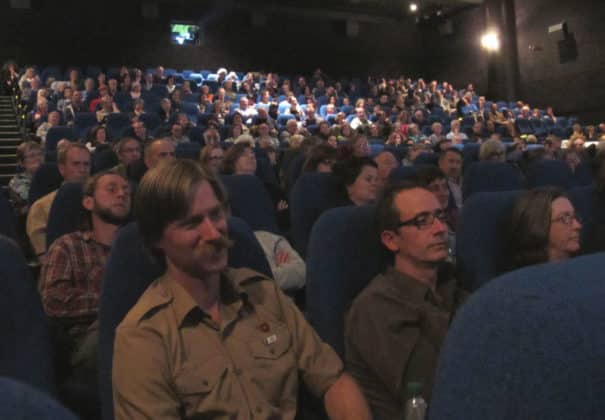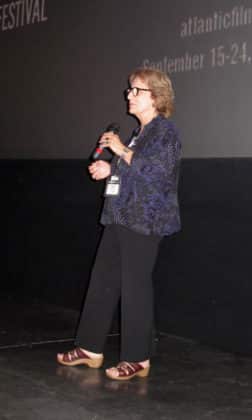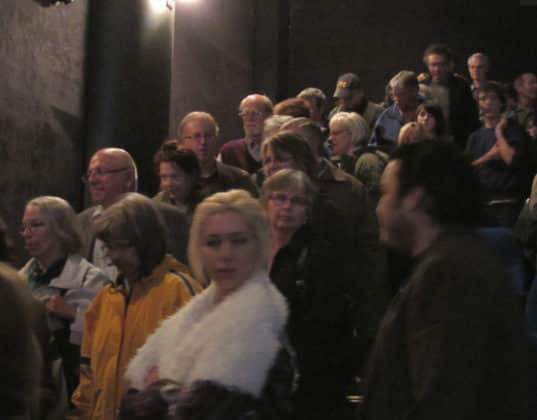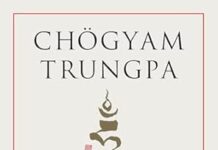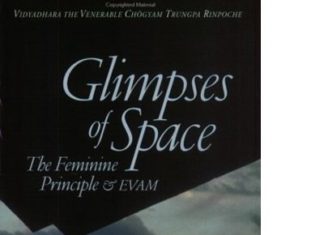Review by Grant MacLean
People who were around Chögyam Trungpa Rinpoche for years, day in and day out and often around the clock, confess that they had no idea who he was. His wife, Diana Mukpo, has said that even after decades together “Fundamentally, I didn’t know what made him tick.”
Yet for many who met him he was far more fully present and direct, kinder and more loving, more mischievous, more terrifyingly insightful than anyone they’d ever met, or had hoped to meet. There was a far echo to it all. In some mysterious way he appeared not to really dwell in his body. He seemed somehow to exist just for you, to be there only because you were.
How do you make a movie about someone who felt at once fully present yet entirely absent? How do you picture the face of enlightenment? Where do you start?
Johanna Demetrakas, in her recently released documentary Crazy Wisdom, starts by leaping into the middle of Trungpa Rinpoche’s teaching and the times that evoked them. Scenes of street violence and war are accompanied by haunting lines from his Sadhana of Mahamudra: “Although I live in the slime and muck of the dark age … in the thick black fog of materialism … the time of hell on earth … I still aspire to see your face.” The sadhana reflects our times, which demand from genuine teachers something less easy and conventional, an approach Rinpoche described as “wisdom gone wild, craziness gone wisdom.”
And so we’re into the movie: a clip of Rinpoche sitting soft and erect in his grey Aquascutum suit in front of a Shambhala banner, gently smiling before bowing most elegantly to the audience; a short clip of Allen Ginsberg talking of some rawly personal advice on poetry Rinpoche had offered; and so on. It’s a rich bounty, a trove of photographs I’d not seen before, clips of Rinpoche’s doings and teachings, and vibrant, touching interviews with students or friends, or with people whose paths he’d crossed and who, while they may not have become Buddhists, had their life’s arc shifted by the experience.
From its wellsprings in events in Tibet and Bhutan the movie makes its way across the terrain of Rinpoche’s world, to his final days in the Halifax Infirmary, the city under a heavy overcast, the harbour locked in by ice that hadn’t been seen there for many years all of which dissolved with his passing and then the cremation in a Vermont meadow under a rainbow, dutifully reported by the New York Times, that appeared from a clear blue sky amid a cirrus entourage which to many was in the form of symbols at the heart of his teachings.
It’s a loose and expansive form, and the movie’s no biography, no careful tracing of a life’s course. Nor, at the other end of the spectrum, is it really a love poem. More than a portrait, something like an ikebana installation, not quite a poetic montage, it’s in some ways a teaching space, evoking both the teacher’s presence and his students’ reactions to him.
In her Chronicles Radio interview [Dispatches episode 18 September 2011] Johanna describes her aim as creating an experience for non-Buddhists, of “creating a process for my audience … the whole orientation was to create a situation where people would have a glimpse of his mind … everything in the film goes towards that.” She says that, unlike other films she’s made, “I was able to completely trust myself … as if I was to show it to Rinpoche now …”
Reviews from professional critics have been positive although, maybe predictably, both Variety and the Hollywood Reporter describe the film as hagiographical, a movie made by an acolyte for fellow-acolytes. Perhaps less predictably, as with the reviewers for Boulder’s Daily Camera and Tricycle, the more critics know of Trungpa Rinpoche the warmer and more perceptive the review. Close to home, the Shambhala Times’ reviewer concludes by writing “all I could think of was how appreciative I was to have this film to show my granddaughter one day, so that she would be able to have tea with the man behind the teachings as well.”
Although it might not be destined to be picked up by major movie chains and shown “at the cinema nearest you,” the film’s appeal speaks for itself: every festival showing has sold out at the Atlantic Film Festival in Halifax a second show was scheduled to cope with the overflow from the first. Future showings and reviews are likely to combine with word of mouth to find the movie an ever-growing audience, and although a stream of future films could be made about this remarkable man it will stand as an enduring documentary of his life and teachings.
That might be about as much objectivity as this reviewer can manage. As one of those “acolytes” I lack the cool objectivity of a Hollywood reviewer, and have tried, and failed, to create some distance from which to say something intelligent or perceptive about the movie. How do you talk about someone who, in spite of all laziness and of ego’s seemingly endless struggles to distract and entertain, has pervaded your life? How do you talk of a love that splits from stem to stern?
Before the Halifax showing I’d seen Crazy Wisdom online as part of the Tricycle Film Festival. Some previous works on Rinpoche’s life had seemed to me to be flat, or a disservice to his teachings and memory, and I was braced to be disappointed, even appalled. But as I watched, I felt stirred, filled, moved to tears, the surge of emotions mixing with a wave of relaxation and relief: here was a work that I felt exalted rather than muddied his memory.
Seeing it on the big screen, the sound much brighter and richer, surrounded by a packed audience of friends, the experience felt radically different. It was in every way a larger space, the movie somehow vaster, deeper, personal boundaries dissolving out into it. Thoughts and emotions came up, small flutterings and large swells of stuff, amusement, delight, irritation and the rest of them, maybe more raw and lonely this time. By the end I felt that I’d been on a potent personal journey, much as I’d felt in teaching situations with Rinpoche himself.
And so it might be one mark of this brave and lovely movie’s success is that in the end, when all’s said and done, I really have nothing to say about it.




